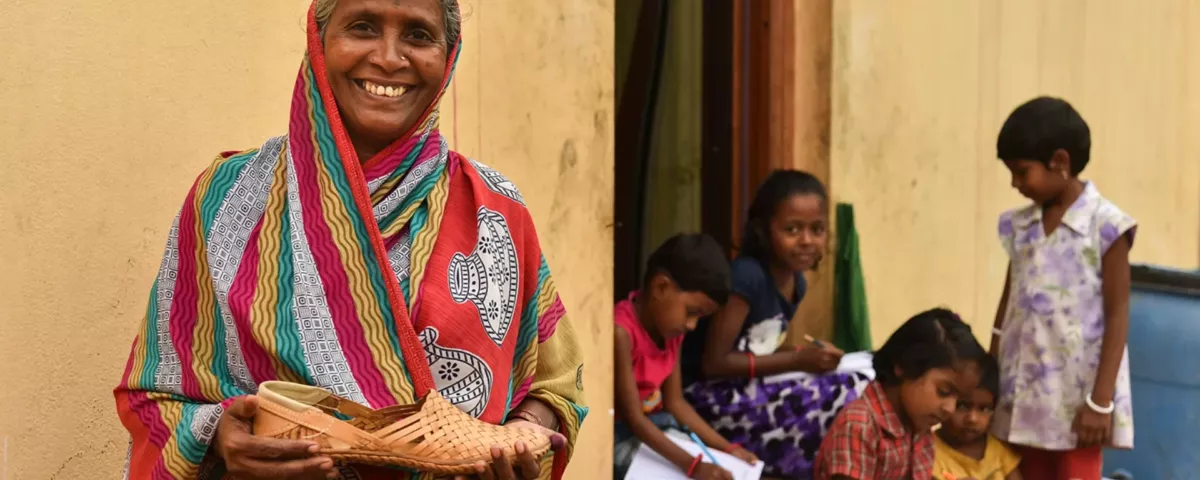




Keep this story going! Share below!
DesiHangover is a conscious fashion brand focusing its innovation on two aspects- its business model and the product itself.
They have provided dignified opportunities to artisans and their families, which directly contributes to SDG 8: Decent Work and Economic Growth. Also, the product- footwear making involves natural ingredients and upcycled leather. This process enables their contribution to SDG 12 and SDG 13.
Using a scalable Hub and Spoke Business Model, the company has a centralized Central Production Unit, which provides skill sets, raw materials, and technology that the artisans may need without affecting the values of the community. This model connects thousands of houses to the hub. Thus, helping the artisans in learning their livelihood.
Product quality is the second aspect of innovation, which focuses on matching the comfort, utility, and style of big brands in traditional footwear. And, also the process of making footwear itself is based on upcycled material and natural ingredients to minimize waste.

As a 20-year-old, Hitesh Kenjale, the co-founder of Desi Hangover, was surprised by the attention his Kolhapuri footwear was getting in Egypt, which he visited as part of an exchange program. He realized locals were awestruck by the footwear design and manufacturing and the artisans' story behind it.
“That was the first time that I realized as an individual that the products are not only utility-based, but there is so much that goes on behind, and the world outside of India values a lot of these things.”
He returned from Egypt intending to help Indian artisans achieve the same level of recognition as their Italian counterparts. While traveling across Indian villages, he noticed how badly the artisans' situation and the role caste played. These artisans possessed the skills and values but couldn't monetize them because of the lack of opportunities.
He founded Desi Hangover in 2014 to aid the artisans' community and promote traditional Indian footwear worldwide.
“As a 20-year-old, let’s try to do something. It wasn’t a business idea- to keep continuing to help the artisans.”
Highly-skilled Artisans had lost their self-confidence due to seclusion. The business intended to raise its morale by creating a sustainable value chain with the betterment of the artisans at its core.
The impact of this initiative was seen in the upliftment of women in society. There is a wide income disparity that exists between men and women. Men over-shadowed women in terms of employment and the pay they received. The company, however, had a different perspective. Currently, their team of artisans has 50% women, which is a clear indicator of their success. They also introduced a direct pay-to-accounts system which made these women artisans more independent and helped them regain self-confidence.
Apart from this, there was a significant increase in the overall income of artisans by 2.7 times, leading better standard of living and bringing more predictability to their income levels. The financial gains attracted the local youth who otherwise would have migrated to nearby cities for employment, bringing the average age from around 45 to 32 years in the workforce.
Instead of greenwashing, they focus on the quality of the product, and sustainability comes secondary.
“We wanted the product to sell before the story.”
Working with leather has been looked down upon in India, causing artisans to lose respect in the community. These artisans were unaware of their skills, which is why the company focused on the sustainability of the artisan community and future generations.
“It’s not like we gave them shares from profit; we make them part of our value chain itself.”
The company has a 50-50 ratio of men and women employees and transfers the money directly to their accounts. This process ensures the women earn independently and aren’t dependent on the men of their families.
Working with DesiHangover, artisans have witnessed a 270% rise in income.
After the company’s roaring success, DesiHangover has recently acquired top Indian brands like FabIndia and Metro as their clients.
“Human life should also be made sustainable.”
The company has created an ecosystem with the Chamar and Dhor communities around Kolhapur, which were otherwise operating separately. The Dhor community tans the leather using Babool bark and turmeric to provide leather to the Chamar community, then transforms it into Kolhapuri-style footwear.
“Today, what happens to funnel our profit back into the community? Logically it’s not the right thing to do, but emotionally it is. The investment results take a lot of time to be realized, like ten years or so. As a business, if you put that same amount of money in onboarding or marketing activities which will help you build a better market, directly proportional to the impact created on the ground.”
The company uses only dead cattle skin treated with Babool bark and turmeric to remove the proteins from it to prevent decomposition and methane emission.
Get stories of positive business innovations from around the world delivered right to your inbox.
Hitesh Kenjale, Co-Founder


DesiHangover is a retail footwear brand that manufactures its products out of upcycled leather. They have unique designs inspired by the traditional design of Kolhapuri footwear. The company is based out of Mumbai, Maharashtra.